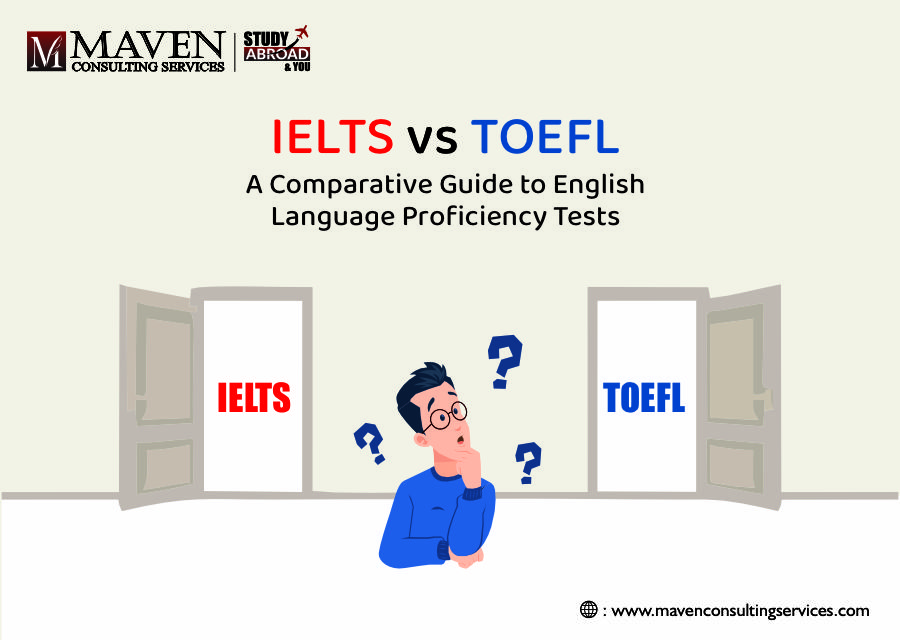IELTS vs TOEFL: A Comparative Guide To English Language Proficiency Tests

As international travel, global business, and educational opportunities continue to expand, standardised language proficiency tests have gained prominence.
Two of the most widely recognised and accepted tests for assessing English language skills are the Test of English as a Foreign Language (TOEFL) and the International English Language Testing System (IELTS).
While both tests serve the same purpose of evaluating a non-native English speaker’s ability to communicate effectively in English, they differ in various aspects, including test format, content, scoring, and intended usage. Here are some key differences between IELTS and TOEFL:
1. Test Structure:
| IELTS: IELTS has two main versions: Academic and General Training. The Academic version is intended for those seeking higher education, while the General Training version is suitable for work or immigration purposes. IELTS consists of four sections: Listening, Reading, Writing, and Speaking. |
| TOEFL: TOEFL is designed primarily for academic purposes and is often required for admission to English-speaking universities. It includes four sections: Reading, Listening, Speaking, and Writing. |
2. Test Content:
| IELTS: IELTS tests a wide range of English language skills. The Speaking and listening sections are the same for both the General Training and Academic versions, while the Reading and Writing sections differ in content. The topics in the Reading and Listening sections cover both academic and general contexts, and the Writing section requires candidates to respond to both task-based and discursive prompts. |
| TOEFL: TOEFL places a significant emphasis on academic English skills. The Reading and Listening sections contain academic passages and lectures, often found in university settings. The Speaking and Writing sections focus on expressing and supporting opinions on academic topics. |
3. Speaking Section:
| IELTS: The IELTS Speaking section is a face-to-face interview with an examiner. It is divided into three sections: |
| A general introduction |
| A brief speech on an assigned topic |
| An interview with the examiner |
| This format assesses a candidate’s ability to engage in spontaneous conversations. |
| TOEFL: The TOEFL Speaking section requires candidates to express opinions on familiar topics, summarise reading and listening passages, and participate in academic discussions. The responses are recorded and evaluated by multiple raters. |
4. Scoring System:
| IELTS: IELTS scores range from 1 to 9, with half-point increments. Each section receives a separate score, which is averaged to calculate the overall band score. |
| TOEFL: TOEFL scores range from 0 to 120, while each section is scored on a scale of 0 to 30. The four section scores are added together for a total score. |
5. Test Delivery:
| IELTS: IELTS offers both paper-based and computer-based test options, depending on the test centre and location. Speaking assessments are given face-to-face with the examiner. |
| TOEFL: TOEFL is predominantly administered as an internet-based test (iBT), although a paper-based version is available in areas with limited internet access. The Speaking section in TOEFL iBT is recorded using a computer microphone. |
6. Score Validity:
| IELTS: IELTS scores are valid for up to two years from the test date. |
| TOEFL: TOEFL scores are typically valid for two years, but some institutions may accept scores older than two years. |
7. Regional Preferences:
| IELTS: IELTS is widely accepted in countries like Australia, the United Kingdom, Canada, and New Zealand, as well as many European countries. |
| TOEFL: TOEFL is often preferred by universities and institutions in the United States and North America. |
8. Test Availability:
| IELTS: IELTS is offered in over 1600 test centres across more than 140 countries. |
| TOEFL: TOEFL is available at more than 11,000 testing centres in over 150 countries. |
While IELTS and TOEFL differ in their approaches, both tests share some common features:
- Global Recognition: Both IELTS and TOEFL are internationally accepted and recognized by thousands of universities, colleges, employers, and immigration agencies worldwide. They provide a standardised measure of English language proficiency that is understood and respected globally.
- Language Proficiency Assessment: Both tests are designed to assess the four primary language skills: Listening, Reading, Writing, and Speaking. They aim to evaluate a test-takers ability to understand, communicate, and use English effectively in various contexts.
- Standardised Scoring Systems: IELTS and TOEFL both use standardised scoring systems to assess test-taker’s performance. These scores help institutions and organizations compare candidates’ language proficiency levels consistently.
- Computer-Based Versions: Both tests offer computer-based versions in addition to their traditional paper-based formats. This allows test-takers to choose a format that aligns with their comfort and familiarity with technology.
- Preparation Materials: Both tests provide official preparation materials, study guides, online resources, and practice tests to help test-takers prepare effectively for the exams. Additionally, numerous third-party resources are available, offering a wealth of study materials for those seeking to improve their skills.
Conclusion
The choice between IELTS and TOEFL is not a matter of which test is better, but which better aligns with your goals and strengths. Both tests provide a valid and internationally recognised assessment of English language skills, albeit with different approaches and focus.
When making your decision, consider your academic aspirations, personal preferences, and the specific requirements of the institutions or organizations you are targeting. Regardless of your choice, adequate preparation and practice will be essential in achieving success on either test, ultimately opening doors to a world of educational and professional opportunities.










